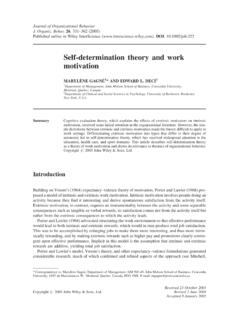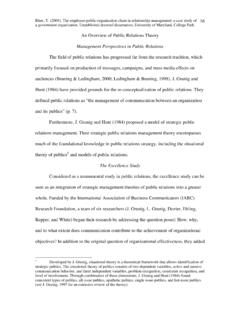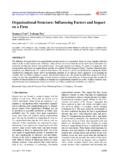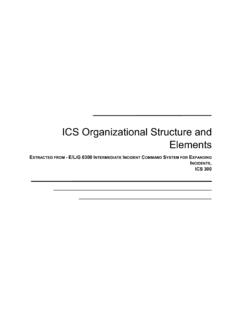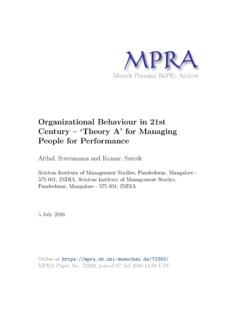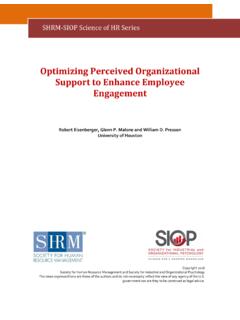Transcription of Organizational Cultural Theory and Research Administration …
1 52 SOCIETY OF Research ADMINISTRATORS INTERNATIONALO rganizational Cultural Theory and Research Administration Knowledge Management Dwayne W. LehmanCarnegie Mellon UniversityAbstract: The Administration and management of sponsored projects spans many levels within an institution of higher education. Research Administration professionals require an operational understanding of a complex and intertwined set of disciplines that include project management, finance, legal, ethics, communication, and business acumen. The explicit knowledge needed for Research Administration is visible in work processes, policies, procedures and organized knowledge repositories.
2 The implicit, or tacit knowledge required for the profession is much more difficult to externalize, codify, store and share. The management of this knowledge is greatly affected by the culture of the organization where the person works and the Research Administration community of practice. By applying Organizational culture Theory to the Research Administration profession and exploring shared artifacts, espoused beliefs and values, and basic underlying assumptions, barriers and opportunities for knowledge management initiatives are realized.
3 Creating and sustaining a knowledge-sharing community involves establishing knowledge leaders in organizations that exhibit the ideals, beliefs and principles of the profession, allocating opportunities for Research Administration professionals to communicate and share, utilizing dynamic information systems, and establishing metrics for knowledge management : Research Administration , knowledge management, Organizational culture Theory , higher educationBackground and ObjectivesResearch conducted at colleges and universities is big business.
4 It is an integral part of a institution s mission and represents a significant portion of the academic activity on campuses. The Research endeavors can increase the prestige and competitive standing of the institution (Turk-Bicakci & Brint, 2005). In response to this climate, higher education institutional leaders are promoting and developing more complex Research strategies that include interdisciplinary, intercollegiate, and international collaborations (Derrick & Nickson, 2014; Langley & Huff Ofosu, 2007; Rutherford & Langley, 2007; Turk-Bicakci & Brint, 2005).
5 As the political and global environment of sponsored Research at universities increase, so do the management, fiscal accountability, and reporting requirements of Research projects (Lintz, 2008; Rutherford & Langley, 2007; Smith, Trapani, Decrappeo, & Kennedy, 2011). These factors have expanded the administrative requirements of Research and increased the essential domain of knowledge that Research administrators must possess to accomplish their Journal of Research Administration , (48) 2 SOCIETY OF Research ADMINISTRATORS INTERNATIONALThe Administration and management of Research at an institution of higher education is a multifaceted task that spans an institution.
6 Collectively Research administrators at institutions of higher education form a community of practice. A community of practice is defined as a group of people, who share a craft or profession (Lave & Wenger, 1991). Research Administration across institutions of higher education also forms a type of organization. March and Simon (1993) define an organization as a system of coordinated action among individuals or groups whose preferences, information, interests, or knowledge differ (Organizations, p. 2). An organization survives through the control of information, formation of an identity, creation of shared stories and incentivizing acceptable behaviors (March & Simon, 1993).
7 Research Administration represents the business support necessary for the success of any exploratory initiative (Kulakowski & Chronister, 2006). The collection of knowledge that Research administrators are required to grasp in order to accomplish their duties spans a diverse range of disciplines. These professionals require a working knowledge of business and project management, and the legal, ethical, scientific, and fiscal components of academic Research (Kulakowski & Chronister, 2006; Shambrook & Roberts, 2011). In order for the profession to grow and evolve, this knowledge has to be collected, categorized, and shared among the Research Administration community of practice.
8 The successful management of knowledge in any organization is highly influenced by culture. Applying Organizational culture Theory to the Research Administration profession and exploring the shared artifacts, espoused beliefs, values, and basic underlying assumptions of Research Administration , reveals common barriers to knowledge management and opportunities for creating a knowledge-sharing Research Administration community of and knowledge managementKnowledge is the most valuable resource in any organization. It is the cornerstone of an institution s competitive strateg y and necessary for an organization s survival (Davenport & Prusak, 1998; Naserieh, Pourkiani, Ziaadini, & Fahim, 2012; Serban & Luan, 2002; Schmitz, Rebelo, Gracia, & Tomas, 2014).
9 Knowledge enables a person to interpret incoming information and data about a situation and identify the implications of that information to either take action or ignore it (Steyn, 2004). Davenport and Prusak (1998) provide a comprehensive definition of knowledge:Knowledge is a fluid mix of framed experience, values, contextual information, and expert insight that provides a framework for evaluating and incorporating new experiences and information. It originates and is applied in the minds of knowers. In organizations, it often becomes embedded not only in documents or repositories but also in Organizational routines, processes, practices, and norms.
10 (p. 5)Knowledge differs from data or information. Data is a collection of separate, objective facts about an event that can be measured qualitatively or quantitatively, but provides no interpretation, or basis for action (Davenport & Prusak, 1998; Serban & Luan, 2002). Information is data that has been given shape and organized in some manner by the members of an organization to be relevant and purposeful (Davenport & Prusak, 1998; Drucker, 1988, O Dell & Grayson, 1998). Knowledge therefore, is the application of experience and judgement to information by an individual, group or organziation (Serban & Luan, 2002, p.)










